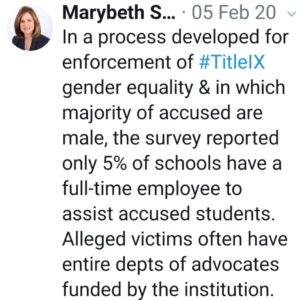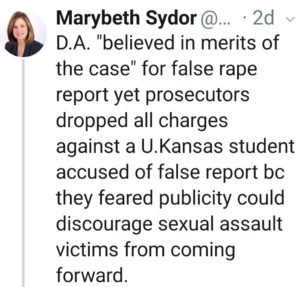SURVEY CONFIRMS Unfairness of Campus Title IX on Due Process
 Education Secretary Betsy DeVos recently indicated that the process for creating fairer Title IX regulations has reached its final stages. As the new rules loom, the higher-ed establishment has demonstrated an almost uniform opposition to creating fairer Title IX procedures. The most recent example came from NASPA, the organization of student affairs officials.
Education Secretary Betsy DeVos recently indicated that the process for creating fairer Title IX regulations has reached its final stages. As the new rules loom, the higher-ed establishment has demonstrated an almost uniform opposition to creating fairer Title IX procedures. The most recent example came from NASPA, the organization of student affairs officials.
Few organizations more enthusiastically supported the accuser-tilted status quo in Title IX adjudications. It, therefore, might seem surprising to read a report summarizing a new survey of student affairs professionals refuting “the common narrative that institutions are not concerned with responding parties’ rights in sexual misconduct cases.” Report authors Jennifer Henkle, Jill Dunlap, and Joan Tabachnick boast that their “study’s results portray a very different picture” than “narratives” that “paint institutions as being overly-concerned about the rights of survivors at the expense of the rights of respondents.”
In fact, the survey’s own data suggests the opposite conclusion—that, even before the formal adjudication process occurs, the Title IX process is deeply biased against the accused. For instance, the survey showed that only 5% of schools have even one full-time employee to assist accused students; 85% have no budget dedicated specifically to providing services for accused students. Most schools conceded that their personnel who did assist accused students spent only 1-3 hours per week on their efforts… The issue of confidentiality is the most troubling aspect of the report. Nearly 6 in 10 schools do not provide fully confidential services to accused students. Despite all of these problems, fully 91 percent of the survey respondents claimed that their schools provided equal or equitable treatment of accused students in the Title IX context.
That a school without even one paid employee to look after accused students, where the “services” too often presume guilt, and where some schools won’t even promise confidentiality to accused students could be deemed “equitable” to the accused confirms the need for robust regulations to protest students’ rights.
mindingthecampus-Johnson













